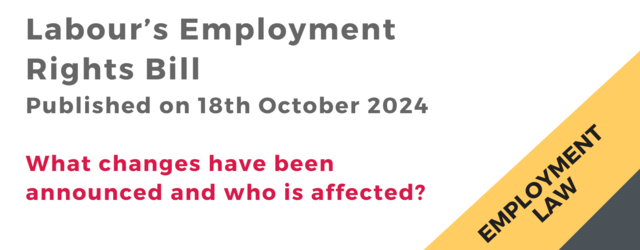
Employment Law Changes from April 2025 – what do employers need to know?
As part of the government’s pledge to deliver on its promise to Make Work Pay, we will see various statutory payment rate changes from April 2025 as well as an increase to the minimum wage and Neonatal Care Leave becoming a day 1 right.

What are the proposed changes to the Employment Rights Bill?
The UK Government's consultation on the Employment Rights Bill has culminated in several significant amendments aimed at enhancing workers' rights while addressing concerns from businesses and other stakeholders. Initiated in October 2024, the consultation sought feedback on various aspects of the proposed legislation, leading to a series of revisions being published at the beginning of March 2025.

Neonatal Leave becomes a Day 1 right
The Department for Business and Trade confirmed that a day one right to neonatal leave for working families with babies in neonatal care will be introduced from 6 April 2025.

Domestic Abuse – What can employers do to support employees?
Domestic abuse is alarmingly prevalent in the UK. Employers should consider the impact of domestic abuse on employees as part of the duty of care and put procedures in place to support them.

Employment Law Changes in 2024 and What Employers Can Expect for 2025
The UK employment law landscape has undergone significant changes in 2024, and more updates are on the horizon for 2025 and beyond. These reforms impact employers, demanding careful consideration by them to ensure they are legally compliant and ensuring they are following best practice.

Work Christmas parties and the law
Work Christmas parties are a staple on the corporate calendar, but it is always important to remember that even though it is a Christmas party, it is also a work event. As an employer, you have a responsibility to your workers and a duty to ensure the rules are followed.

Business First Magazine - Autumn/Winter 2024
Welcome to the Autumn/Winter edition of Business First Magazine.

Labour’s Employment Rights Bill: What changes have been announced and who is affected?
The Labour government’s new Employment Rights Bill (published on 18th October 2024) introduces significant changes that aim to improve job security, expand worker protections, and increase flexibility for millions of employees across the UK. Katie Ash, Head of Employment Law at Banner Jones, breaks down some of the key changes and explains who will be affected.

Updates to Sexual Harassment Laws – is your business ready?
As of 26 October 2024, every employer has a legal duty to take proactive measures to prevent sexual harassment in the workplace. This change in the law comes at a time where sexual harassment claims against well-known TV presenters and businessmen are dominating the headlines.

Fire and Rehire Laws – a timely reminder
A recent Supreme Court decision against Tesco serves as an important reminder of the risks of employers using ‘fire and rehire’ to impose changes to terms and conditions and how this should only be used as a last resort.

Navigating the recent changes in UK Employment Laws - April 2024
For HR managers and businesses alike, keeping abreast of Employment Law changes isn't just advisable—it's imperative. Here, Katie Ash, Head of Employment Law summarises some recent regulation changes which came into effect in April 2024.

Improved Redundancy Protection for Maternity Leave
New Regulations came into force on 6 April 2024 in England and Wales to give pregnant employees and those on maternity leave or family-related leave better protection from redundancy.

How to calculate holiday pay in 2024: an update on legislative changes
For many businesses, calculating holiday pay is a straight-forward process. Employers are, within the parameters of the law, able to dictate how many annual leave days or hours a staff member is entitled to.

What is Carer's Leave?
Carer's Leave is where employees apply to be absent from work to provide or arrange care for a dependant with a long-term care need.

Business First Magazine - Spring 2024
Welcome to the Spring 24 edition of our Business First magazine.

Positive Action not Positive Discrimination
People often talk about how certain groups are under-represented within workforces, but what steps can an employer take to redress this? Head of Employment Law at Banner Jones Solicitors, Katie Ash, discusses how employers can use a Positive Action approach to eliminate or reduce discrimination and help these groups access employment or training as outlined in the Equality Act 2010.

An Office Romance – Should a relationship at work be disclosed?
Disclosing a relationship at work depends on various factors, including company policies, the working environment, and the nature of the relationship. Sara Patel, Employment Law Specialist at Banner Jones, explains some considerations to help employees and employers navigate what can sometimes be a complex situation.

Minimum wage changes – is your business ready?
The Government has announced new National Minimum Wage rates for 2025, including the National Living Wage. The new rates which will come into force from 1 April 2025 - is your business ready?

Selling a Business - A Complete Guide
There are many factors to consider when selling a business and it isn’t something that should be entered into lightly. Our free guide runs through some of the important considerations this involves.

Employment Law - Changes employers need to be aware of
As we enter 2024, we’ve been reflecting on some of the significant changes in employment law we have seen over the course of 2023 which employers need to be aware of. These include amendments to the flexible working regime, further deliberations about employment status by the Supreme Court and considerable changes to the calculation of holiday pay. 2024 looks set to be a big year for change in employment law, so here we have done a roundup of key developments in 2023 and have highlighted the ‘ones to watch’ in 2024.

Redundancy Consultation Processes – Advice for Employers
Consultation is a key part of any fair redundancy process. It is therefore vital that employers considering redundancies plan how they will consult their employees about any proposed redundancies at an early stage.

Changes to Flexible Working regulations
New regulations extending flexible working rights were put before Parliament on 11th December 2023. From the 6th April 2024, these new regulations came into force and all employees will no longer need to have 26 weeks’ continuous employment in order to make a flexible working request.

Business Legal Services Team
Our Business Legal Services team pride themselves on being able to offer high quality ‘city style’ advice in a user friendly, cost effective manner to local, national and international businesses.

Holiday Pay Claims – Supreme Court’s Landmark Ruling
The UK Supreme Court has ruled that employees can claim for a series of underpayments of holiday pay, even where there has been a gap of more than three months between different underpayment periods. This could lead to many UK workers being entitled to thousands of pounds in miscalculated holiday pay.

Business First Magazine - Autumn/Winter 2023
Our quarterly business magazine is packed full of features including creating a supportive workplace, sustainable buildings, legally compliant HR and EDI essentials.

Menopause for thought – what do employers need to know?
Women make up a significant portion of the workforce, so it is hardly surprising that gender equality in the workplace has become an important topic in recent decades.

Workers to be given the statutory right to request more predictable working patterns
The Workers (Predictable Terms and Conditions) Bill received Royal Assent on 18 September 2023, becoming the Workers (Predictable Terms and Conditions) Act 2023. This new legislation will give workers the right to request more predictable working patterns relating to the number of hours, times and days of the week that they work.

Managing changes in equality, diversity and inclusion
Most companies work hard to create a safe and productive workplace, but how can businesses stay up to date on these policy and initiative changes, as well as mitigating risks?

Paternity Leave - Calendar News 15th June 2023
Head of Employment Law at Banner Jones, Katie Ash, features in this recent Calendar News item about why people are campaigning for legal reform.

Can a UK employee work remotely in another country?
With the rise of remote work opportunities and the desire for more flexible lifestyles, many UK employees are considering the possibility of working remotely from another country, particularly during the summer months. In this article, we will explore whether a UK employee can work remotely in another country, examine relevant UK laws, and discuss important precautions to consider.

Paternity leave – what is it and why does it matter?
Here Katie Ash, Head of Employment Law, explains what Paternity Leave is, what fathers are entitled to and why businesses need to place as much importance on supporting men in the workplace, as they do women.

How will the teacher strikes affect you?
The news this week that teachers from the National Education Union had voted for more strike action in England and Wales will have left lots of working parents – and their employers – wondering how they are going to manage if the employee’s child’s school is closed.

Can a flexible working request be reversed?
For many, the Covid-19 crisis is starting to feel like a distant memory. However, there are still changes to the way we live and work today that were influenced by the restrictions that were put in place. The biggest example in employment law is the shift to working from home.

Are Restrictive Covenants too harsh?
Would removing non-compete clauses improve worker’s rights? Theoretically, they’re supposed to be in place for C-suite level employees to prevent them taking business secrets to competitors. So, is it necessary to make low-level workers sign non-competes too? Is it too harsh?

Do I need to give paid annual leave for the coronation?
A right royal holiday clash
Holiday pay for the additional bank holiday on 8th May to celebrate the upcoming coronation is giving employers a headache before a toast has been raised to the new King.

Business First Magazine Spring 23
In this issue we cover lots of topical business issues and challenges from Mergers, Layoffs, Going Global, Commercial Property and more

The importance of reviewing & understanding contracts of employment
Employment relationships in the modern working world are vast and varied: from workers, to employees, to consultants, to freelancers. On top of this, businesses operate at all times of day and night, many internationally, and following Covid-19, there is an ever-increasing ability for many individuals to work anywhere in the world.

Twitter redundancies – why cutting costs could prove more costly
Unless you actively avoid the news, you’re probably familiar by now with the headline-grabbing controversy caused by entrepreneur and Twitter’s new owner Elon Musk, after he announced that half of the company’s workforce were to be ‘laid off’ as part of cost cutting measures.

Hiring Christmas temps - What are the rules?
Christmas is often the busiest time of the year for many businesses, so the extra support from temporary staff, ‘Christmas temps,’ around this time, is often appreciated. As an employer, however, it is important you know the rules inside out to keep you on the right side of employment law.

Accidents at Work Advice
Our Personal Injury specialist Sarah Sadler discusses what employers must to do keep their staff safe, as well as what an employee can do if they suffer an accident while at work.

Settlement Agreement Advice
Katie Ash explains and answers some questions about settlement agreements.

Managing Redundancy in your Business
Katie Ash, head of Employment Law, answers the most commonly asked questions about redundancy.

New legislation on tipping protocols
Hospitality workers must receive all gratuities and service charges without deductions in future.

Holiday pay ruling upheld for part year workers
Holiday pay for those who work only part of the year and have no contractually set hours should be calculated on the basis of average earnings, the Supreme Court has confirmed.

The HR Manager myth buster
Here Sara Patel, an employment law expert at Banner Jones, helps to separate the facts from the fiction, and clarifies the law and the role of employers in relation to a few of the most common workplace myths.

Why businesses should embrace the Employment Bill changes
Workers’ rights have long since been protected by law… to an extent. However, in 2019 the Conservative government promised to introduce a unified Employment Bill which would hold British businesses accountable across the board.

Why the consultation period matters when making redundancies
Running a business can be challenging, and never more so than when decisions need to be made that potentially affect the lives and livelihoods of employees.
Sadly, however, it is part and parcel of the day job, and most business owners and decision makers will grapple with the prospects of having to let people go, and the subsequent redundancy process, at some point during their career.

Protecting the mental health and wellbeing of employees is more than just a workplace perk
As such a large part of an employee’s life is spent at work, it’s important that employers play an active role in ensuring that their workers develop and maintain good mental wellbeing and a healthy relationship with their place of work.
This is particularly important post-pandemic, when it is widely acknowledged that employees' health has suffered because of lockdowns, job uncertainty, and the mandate to work from home.
After all, healthy and well-motivated employees will have an equally positive impact on the productivity and effectiveness of a business!

The Great Resignation – how to minimise disruption across your business
One of the most widely publicised phenomena caused by the pandemic is what has now become known as The Great Resignation.
According to a poll undertaken by recruiter Randstad UK in November of last year, almost 7 in every 10 employees (69%) said they felt confident to move to a new job within just a couple of months.

How to avoid an Employment Tribunal
The cost of defending Employment Tribunal cases can vary significantly and could cost your business anything from £10,000 to £50,000. Then if the claimant is successful, there will be the cost of compensation on top of this. The average award for an unfair dismissal case in the UK is a little under £7,000, with claims resulting from discrimination costing significantly more. Businesses also need to consider the hidden cost of employment law claims caused by the damage it can do to their reputation as an employer and as a business that clients and customers want to work with. Often this cost can be more damaging than the award itself.
.

What are your contractual obligations to hybrid working?
Most employers will be familiar with the flexible working regime as it has been used in the workplace for almost two decades, and although hybrid working is relatively new, it is important to note that it is simply a type of flexible working. The statutory flexible working regime allows any employee with more than 26 weeks’ service to request to work flexibly and sets out a framework that you must follow where a request is made by an eligible employee.

Employment Law: Age Discrimination in the Workplace
Age discrimination claims to employment tribunals have risen steeply since the pandemic, and a recent case has highlighted the challenge for employers using a mandatory retirement age.

Employee rights – Compulsory Vaccinations Update September 2021
From 11 November 2021, all care home workers and anyone entering a care home must be fully vaccinated, unless they are medically exempt under the Health and Social Care Act 2008 (Regulated Activities) (Amendment) (Coronavirus) Regulations 2021.

Compulsory vaccinations in the care sector
With the Covid-19 vaccine fast being rolled out across the country and all over 18’s to be offered a first dose by the end of June 2021, the Government has now mandated that all people working in elderly care MUST be vaccinated in order to continue to do this work. The new legislation, which is subject to Parliamentary approval, is expected to come into force from October.

Recruitment - How to get it right
In our latest blog Head of Employment Law, Katie Ash, goes through the eight key steps to lawfully recruiting someone into your business. It can be a costly mistake to ignore the rules and get this wrong.

An employer's guide to flexible working
Flexible working has been at the forefront of many businesses since the pandemic began, and for many it is now time to formalise a flexible working policy. This guide tells you how to handle flexible working requests but we can also assist with a policy if required.

Out of hours communication – do you know the law?
For many business owners and decision makers, the lockdown restrictions introduced as a result of the Covid-19 crisis have provided them with an unprecedented opportunity to review their operations.

Gender Pay Gap Reporting: Your Questions Answered
Over time, the gap between women’s and men’s median hourly earnings has been narrowing. In fact, according to the Office for National Statistics (ONS) it has fallen by over a quarter among full-time employees in the last decade.

The Uber Ruling and the future for the Gig Economy.
On the 20th February 2021, the Supreme Court handed down its Judgment in the long awaited Uber case (Uber BV and Others v Aslam and Others). All six Judges unanimously ruled that the Uber drivers were workers, not self-employed contractors and as a result were entitled to basic employment rights like National Minimum Wage, holiday pay and sick pay.

Redundancy in the hospitality sector: what do employers need to consider?
With the country now in its third lockdown, it is clear that the hospitality sector has been hit the hardest and with no sign of hotels, pubs and restaurants reopening soon, employers in this sector will be almost certainly be facing some tough decisions about their staff in the coming weeks and months.

Skilled Worker Visas: What your HR team need to know
After a lengthy transition period, the UK has now left the EU with a deal agreed. While many possible scenarios have been discussed at length in recent years, until now we have been limited to speculation and conjecture in terms of what the outcome might be. Not to mention how it might affect businesses and, more specifically, employees.

Looking after your workforce- what are your responsibilities for lone workers?
Employers need to protect the mental health of those who work alone. This blog gives you an overview of what you should be considering.

What is the Good Work Plan and why does it matter?
For many, 2020 will go down in history as the year that changed everything, and one of the most significant changes was the way in which we work.

Restrictive Covenants
At Banner Jones Solicitors, we can help with all aspects of employment law. In this video, we will discuss restrictive covenants and how they can impact you. For more information, watch our video.

Protecting your business and your employees during difficult trading periods
As the country continues to grapple with the evolving situation relating to the Covid-19 pandemic, many businesses and business owners are reacting in real time to the government advice relating to social distancing and non-essential travel.

The Good Work Plan

Handling Holiday Season as an Employer

Dementia in the workplace – what are your responsibilities
In a previous article, we looked at the impact of the country’s ageing population on the UK workforce, and the subsequent impact that it was having on employers and businesses large and small.

Redundancy Procedure Guide
We have put together a redundancy procedure guide for employers to outline the full process, selecting people for redundancy, common mistakes and vital information you should consider to be able to make informed decisions.

Disciplinary Action Guide
We have put together a Disciplinary Action Guide for Employers featuring procedures, problems and grievances.



